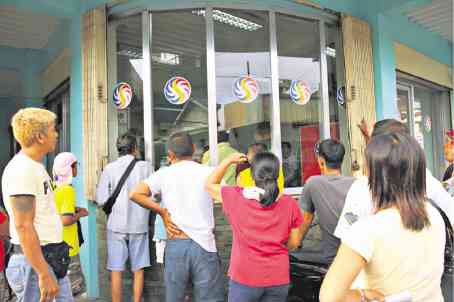
Bettors wait for results of a Small Town Lottery draw in Lucena City. —DELFIN T. MALLARI JR./ INQUIRER SOUTHERN LUZON
MANILA — From jueteng lords to partners for development.
This was how officials of the Philippine Charity Sweepstakes Office (PCSO) described the future of illegal gambling operators who have been granted franchises to operate the state-sanctioned Small Town Lottery.
Smarting from their previous experiences, PCSO general manager Alexander Balutan expressed confidence that the reinvigorated STL system would be the solution against underground numbers games such as “jueteng,” two-ball and “masiao.”
However, he admitted that the expanded STL operations would not totally stamp out unlawful gambling activities in all parts of the country.
From the previous 18 gaming firms operating in 14 provinces and four cities, he said 56 companies or authorized agent corporations (AACs) have been allowed to conduct STL draws nationwide.
“We cannot stop illegal gambling 100 percent because there is still corruption. But it would definitely reduced corruption,” Balutan said in a news briefing in Malacañang.
He noted that suspected jueteng lords Ramon Preza, the incumbent mayor of Tiaong, Quezon, and a certain Eddie “Kabayo” Gonzales, had encouraged gambling operators to apply for legitimate STL franchises in Laguna and Quezon provinces.
PCSO chair Jose Jorge Corpuz said the implementing rules and regulations in the STL operations would prevent unscrupulous individuals from using the state-sanctioned lottery games as front for jueteng and other similar illegal numbers racket.
He said STL operations would rake in as much as P30 billion for the government this year, which would be used to finance President Duterte’s charity projects and medical programs.
“STL will be the only legal numbers game in the country,” Corpuz said. “If there is STL in the area, there is no corruption. But if there’s no STL in an area or in the provinces or cities, there is corruption because there is illegal gambling.” SFM


